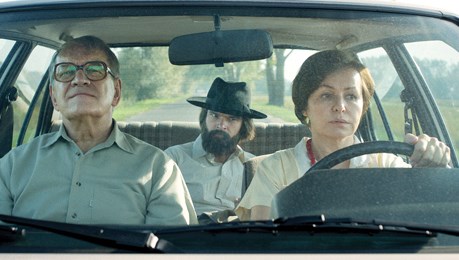The Last Family (Poland 2016, director Jan P. Matuszynski), Pacific Cinémathèque, Oct. 9, 6 p.m. as part of the Vancouver International Film Festival (viff.org).
The artist holds the mirror closely to the old woman’s mouth.
He sees fog. She’s still alive.
“Too bad,” he remarks.
The Last Family seems so bleak it feels like it should have a cinematic restraining order against funny. However, there’s a line of melanoma-black humour running through this unflinching chronicle of a family steeped in eccentricity, misery, intelligence and that indefinable things that bonds families.
We spend most of the movie with Polish surrealist artist (and Alicia Silverstone fan) Zdzislaw Beksinski. We meet his wife Zofia and their deeply troubled son Tomasz, tracking all three through the narrow corridors of their apartment. With his penchant for tracking shots and shooting through doorways, director Jan P. Matuszynski gives us the sense we’re voyeurs, watching a family that’s unhappy in ways even Tolstoy didn’t anticipate.
This is a movie about life and death. Well, mainly death.
“Death is all around this family,” noted director Jan P. Matuszynski from behind a cup off black coffee. “That sense of humour, that’s a part of this family.”
Like John Ford with a handheld camera, Matuszynski loves compositions that include the whole family, leaving it to the viewer to follow whoever intrigues them most.
Sandwiched between film festival appearances in Reykjavik and Montreal, Que., Matuszynski sits in a Marine Drive coffee shop and reflects on the movie’s “strange, dark, sense of humour.”
“Maybe it’s not for everybody, but it works.”
That sense of humour is most daring and effective in the scenes focusing on Tomasz, who struggles with women, with sex, and the point of it all.
It doesn’t feel like it should be funny, but when Tomasz is confronted with the silence of a psychologist (we assume he’s a psychologist because he’s a bearded man smoking a pipe) he reacts by threatening to pour gasoline over the office to elicit a human reaction.
It’s simultaneously comedic and incurably sad.
Tomasz earned a notoriety in Poland as the radio personality that brought synth-based new wave hits to Poland’s airwaves.
At one point we see him dance to Yazoo’s “Don’t Go” with such desperation we wonder how he’ll readjust when the song ends and life resumes.
The use of seemingly disparate emotional tones becomes more understandable after speaking with self-described “freak of art house cinema” Matuszynski, who speaks with equal enthusiasm about Ingmar Bergman and Jason Bourne.
The Last Family is a biopic in the sense that it’s an account of real people, but it’s far removed from the slew of biographical movies we’ve seen in recent years. This isn’t like that movie where an angry woman demands Ray Charles get out of her house, and he starts playing the organ riff for “Hit the Road, Jack.” (“Ah, that’s where that came from,” we’re meant to think).
“I never wanted to do a biopic (like) that,” Matuszynski says. “I just wanted (the paintings) to hang on the wall.”
Matuszynski drew right from Beksinski’s life.
With recording devices constantly in hand, Beksinski essentially wrote his life story as he was living it.
For Matuszynski, there was far more cinematic inspiration in Beksinski’s VHS recordings of his family than anything he painted.
Much like Beksinski refrained from lowering his camera in even the most emotionally fraught moments of his life, Matuszynski resists cutting. There’s one soul-baring scene in which Zofia tries to convince Tomasz that life is worth living, or at least trying.
The camera is still. Tomasz pours out his insecurities and his helplessness. The audience starts to squirm. We beg for a cut, a break, a respite. But this is a rare film that’s as tough on its audience as it is on its characters.
American writer Kurt Vonnegut once wrote that a, “plausible mission of artists is to make people enjoy being alive at least a little bit.”
The Last Family may not pass the Vonnegut test.
Instead, it offers honesty.
The Last Family isn’t a true story. It’s true.



